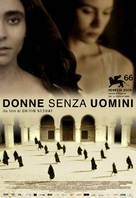Reviews provided by RottenTomatoes
Joshua Rothkopf, Time Out: Set in a seething 1953 Tehran, this is the kind of film that shouts its plot developments from urgent radio broadcasts. Read more
Noel Murray, AV Club: The movie began life as a series of museum pieces, and it retains the transportive effect of a well-conceived exhibit. Read more
Richard Nilsen, Arizona Republic: It seduces us with imagery and metaphor. Read more
Ty Burr, Boston Globe: It's a celebration of women's resilience in the face of absolute patriarchy, an oppression that's felt on personal, cultural, and political levels. Read more
Fred Camper, Chicago Reader: Elegant, often moving. Read more
Cary Darling, Dallas Morning News: Its elegiac mood and chiaroscuro beauty are hard to shake. Read more
Lisa Schwarzbaum, Entertainment Weekly: Neshat's love for interactive video installations and abiding interest in Islamic feminine identity are evident in her dreamy first feature, a 2009 Venice Film Festival prizewinner that is stronger on beautiful imagery than on narrative flow. Read more
Gary Goldstein, Los Angeles Times: Though the narrative could use more depth and detail, the film generally absorbs with its strong performances, stirring emotions and vivid imagery. Read more
Ernest Hardy, L.A. Weekly: Working from a screenplay she co-wrote with Shoja Azari, Neshat employs dialogue that is often didactic, but that weakness is forgiven in the face of stellar acting from the ensemble and gorgeously composed and shot images. Read more
Walter V. Addiego, San Francisco Chronicle: Women Without Men has compelling stretches, but the film's formal concerns overwhelm the storytelling. Read more
Rick Groen, Globe and Mail: It's an archly poetic, earnestly symbolic treatise trying awfully hard to be an important picture, but not succeeding. Read more
Jay Weissberg, Variety: The script jettisons most of the book's more powerful sections, upping the political angle and inexplicably eliminating motivations that made the strongly feminist story, rich in symbolism, so intriguing. Read more
Rachel Saslow, Washington Post: The material is so relentlessly dark -- suicide, rape, eating disorders and repression all have a home here -- that the film will satisfy only Iranian history buffs and devoted Neshat fans. Read more

